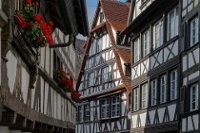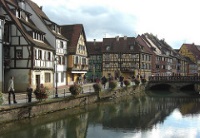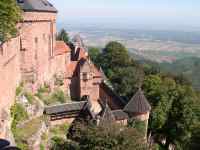Alsace Lorraine Travel Guide
Alsace-Lorraine is possibly the least French part of France, with a strong German heritage, especially in the Alsace region. The two regions, in the northeast corner of France, share borders not just with France and Germany, but Belgium and Luxembourg as well, making the area a true melting pot of European culture.
Pretty towns and villages in Alsace produce distinctive white wines often overlooked by the hordes of tourists in Bordeaux and Champagne country, and the Alsatian Vineyard Route is a great way to sample the region's delectable wines along with delicious Alsatian cuisine. Cities such as Strasbourg and Colmar provide a bit of urban contrast, but preserve the character of the region with UNESCO-listed town centres containing many beautiful historic buildings and lively arts and culture communities.
Because of its geographic location, a holiday in Alsace-Lorraine gives visitors a chance to glimpse the unique culture and history of the region. It also makes a perfect base for a multi-country holiday with easy access to the Rhine Valley, both the French and Swiss Alps, and major cities such as Berne, Basel, Frankfurt and Geneva.
Things to do in Alsace Lorraine
Louis XIV described the Alsace-Lorraine region as a beautiful garden. There are various walking and cycling routes through the countryside, but one of the best ways to see Alsace-Lorraine is by boat. There are many attractions in Alsace-Lorraine and visitors can choose to concentrate on doing a wine tour of the region or a military history tour of the World War I battlefields, cemeteries and monuments. There are some charming medieval villages and cities to explore as well.
Less than an hour's drive from Strasbourg is the city of Mulhouse, which is worth visiting for lovers of the mechanical. The city is home to the National Automobile Museum, and the French Railway Museum. Other things to see and do in Alsace include a visit to Haut-Koenigsbourg Castle, which has a history going back nine centuries.
The capital city of Lorraine is Nancy, a charming city with a fine central square called Place Stanislas. This square has magnificent golden gates and fountains and is surrounded by some lovely old buildings, including the Museum of Fine Art. Other attractions in Nancy include the beautiful Pepiniere Park and the Montsec American Monument, which is dedicated to all those who fought and died in the region in World War I. Lorraine is full of military history and those who are interested in such things should not miss out on a trip to Verdun, which has a great museum and numerous monuments.

Strasbourg
Less than one hours' drive from Mulhouse and three from Paris, Strasbourg is a popular tourist destination in Alsace-Lorraine. The capital and largest city in Alsace, Strasbourg has a beautiful city centre that has been declared a UNESCO World Heritage Site, with many churches, museums, and photogenic half-timber houses lining the narrow cobbled streets. One of the most famous sites in Strasbourg is the great sandstone Gothic cathedral with its astronomical clock. There are a few other beautiful churches as well, with architecture ranging from Romanesque to Gothic to Renaissance.
Strasbourg is also a modern city, however, with a lively atmosphere that belies its historic facade. Good restaurants abound, serving a blend of French, German, and local Alsatian cuisine. Late summer (July and August) is the best time to visit Strasbourg, as the warm weather paves the way for many theatre and music events. Christmas is also a festive time of year, with holiday markets in Place Broglie and Place de la Cathédrale.
From its position on the Rhine River, Strasbourg also makes a great base from which to explore southern Germany (just across the river) and Switzerland (only an hour's drive south).

Colmar
An attractive town in northeast France, Colmar is one of the most popular tourist draws to the Alsace region. Founded in the 9th century, the city boasts many beautiful architectural landmarks, including churches, museums, theatres, mansions, monuments and fountains, many dating back to the 13th century. Colmar is surprisingly big for a medieval city, but visitors should still be able to walk around on foot without much trouble. In addition to its beauty, Colmar is a lively city with music festivals and other events throughout the year. It is also a centre for the German and French-influenced Alsatian cuisine, and visitors can sample local specialties such as quiche Lorraine, Black Forest cake, Sauerkraut, and the many varieties of Alsace wine.
Attractions in the town include the Musee d'Unterlinden (Museum under the Linden Trees), which is a small but popular art and history museum with an impressive collection of artefacts. The most famous piece is the magnificent Issenheim Altarpiece. Little Venice, a particularly pretty neighbourhood in Colmar, is a good place to take a gondola ride and enjoy the medieval architecture that passes by. The Eglise des Dominicains is a lovely church that now houses Martin Shongaurer's painting 'Madonna of the Rose Garden'. The Gothic Eglise St-Martin is also well worth a visit.

Haut-Koenigsbourg Castle
The Haut-Koenigsbourg Castle has a history going back some nine centuries, built in the 12th century as an Austrian fortress. The castle is perched dramatically on a mountain, clearly designed to be defended in times of war and with sweeping views of the Alsace plain below. This impressive fortress has been visited and owned by several notable royals and has changed hands between nations many times. It has also been all but destroyed twice in its long history. The Alsace region was annexed to Germany in 1871, and the castle, at the time only a majestic ruin, was gifted to Kaiser Wilhelm II in 1899. Seeing it as a symbol for Germany's new power in the region, the Kaiser fully restored the fortress and today it is once again a formidable and impressive place to visit.
The present structure of the castle gives an accurate idea of how the mountain fortress must have looked in the Middle Ages. Its interior walls are decorated in a rich medieval style, and it houses an extensive and interesting collection of weapons and furniture, mainly from the 16th and 17th centuries. Visitors can view the royal apartments, kitchen, chapel, ceremonial hall and armoury, as well as the walled garden, forge and mill. Exploring this historic building, which has been scarred and marked by the region's history, is exciting for the whole family.
France travel info
Electricity
The electrical current is 230 volts, 50Hz. European two-pin plugs are standard.
Language
French is the official language.
Money
The euro (EUR) is the official currency in France. Currency can be exchanged at banks, bureaux de change and some large hotels, though visitors will get a better exchange rate at the ATMs. Major credit cards are widely accepted, particularly in major tourist destinations. Foreign currency is not accepted.
Tipping
Most restaurants and hotels automatically add a 15 percent service charge so a tip is not necessary, although another two to three percent is customary if the service has been good. If service is not included then 15 percent is customary. Taxi drivers expect 10 to 15 percent of the fare, and hairdressers about 10 percent. Hotel staff generally receive about €1.50 a day and tips of about €1 are given to washroom and cloakroom attendants and museum tour guides. Tour bus drivers and guides are also tipped.
Health
No particular vaccinations or medications are required for travel to France. The prevalence of certain tick-borne infections, such as lyme disease, tularemia, tick-borne encephalitis, and rickettsial diseases, mean that travellers should take precautions against ticks if they are travelling in rural or forested areas in warm weather. French hospitals and health facilities are first class. Visitors from other EU countries are entitled to discounted medical treatment and medicines on presentation of a European Health Insurance Card (EHIC). After Brexit, the Global Health Insurance Card (GHIC) replaced the European Health Insurance Card (EHIC) for UK citizens. The GHIC allows UK citizens access to state healthcare during visits to the EU. The GHIC is not valid in Norway, Iceland, Liechtenstein or Switzerland, nor is it an alternative to travel insurance. Otherwise, doctors and hospitals often expect immediate cash payment for health services, so medical insurance is advised.
Safety
While violent crime against tourists is rare and holidays in France are generally trouble-free, visitors should be mindful that security has been heightened following a series of terrorist attacks in recent years, particularly in the transport sector. Unattended luggage left in public places will be removed or destroyed by security staff. While generally safe, visitors to France are advised to take precautions against petty theft and to ensure their personal safety. Thieves and pickpockets operate on the metro and around airports. Theft from cars is prevalent, particularly in the south, around Marseilles, and in Corsica. Tourists are advised to conceal bags and purses even when driving, and to never leave valuables unattended in the car. Bag snatching is also common, particularly on public transport and in shopping centres, and visitors should also be vigilant of luggage while loading bags into and out of hire cars at airports.
Local customs
French culture is of paramount importance to the French people. In an increasingly Americanised world they feel duty-bound to protect it, and it is appreciated if visitors can speak a few words of French. Locals do not respond well to being shouted at in English. While the food is second to none, foreigners may find the service in many restaurants sloppy. Waiters can appear rude (particularly in Paris) and take their time. This is just the way they are. Traditional games such as pétanque (similar to lawn bowling but played on gravel) are popular in village squares, but the national sports are football, rugby and cycling. Smoking in public places is not allowed and will incur heavy fines.
Doing business
Business etiquette is important in France. A smart, fashionable sense of dress is common as the nation prides itself on haut couture. Punctuality is not always observed though and the 'fashionably late' tactic may be applied. A handshake is the common form of greeting for men and women upon first introductions. Titles are important and the person is to be referred to as 'monsieur' (Mr.), 'madame' (Mrs.), or 'mademoiselle' (Ms.). Meetings usually occur over lunches, and the French are known to enjoy food. Business hours are generally 9am to 6pm, Monday to Friday.
Duty free
Travellers from non-EU countries over 17 years of age entering France can bring in the following items duty-free: 200 cigarettes, or 100 cigarillos, or 50 cigars, or 250g tobacco. Four litres of wine and 16 litres of beer and one litre of spirits over 22 percent or two litres of alcoholic beverages less than 22 percent. Other goods up to the value of €430 for air and sea travellers, and €300 for other travellers (reduced to €175 for children under 15 years of age).
Communications
The international access code for France is +33. Travellers can purchase local prepaid SIM cards for unlocked phones or use eSIMs if their cellular providers support it on their networks. Free WiFi is available in most hotels, cafes, restaurants and similar establishments.
Passport & Visa
The borderless region known as the Schengen Area includes the following countries: Austria, Belgium, Czech Republic, Denmark, Estonia, Finland, France, Germany, Greece, Hungary, Iceland, Italy, Latvia, Lithuania, Luxembourg, Malta, The Netherlands, Norway, Poland, Portugal, Slovakia, Slovenia, Spain, Sweden, and Switzerland. All these countries issue a standard Schengen visa that has a multiple entry option, and which allows the holder to travel freely within the borders of all the aforementioned countries.
Additionally, travellers must hold sufficient funds to cover their stay in France, and proof of repatriation (a return or onward ticket, and the necessary travel documentation for their next destination). Note that Schengen visas, if required, are also valid for French Guiana and French West Indies and Reunion, provided that the Schengen visa is endorsed "Also valid for French territories being in observation of the respective French territories". We recommend that passports always be valid for six months after intended period of travel.
Entry requirements
US citizens must have a passport that is valid for at least three months after their intended departure from France (and issued within the last 10 years). No visa is required for a stay of up to 90 days within a 180-day period.
UK citizens must have a passport that is valid for at least three months after their intended departure from France (and issued within the last 10 years). No visa is required for a stay of up to 90 days within a 180-day period.
Canadian citizens must have a passport that is valid for at least three months after their intended departure from France (and issued within the last 10 years). No visa is required for a stay of up to 90 days within a 180-day period.
Australian citizens must have a passport that is valid for at least three months after their intended departure from France (and issued within the last 10 years). No visa is required for a stay of up to 90 days within a 180-day period.
South African citizens must have a passport that is valid for at least three months after their intended departure from France and must obtain a valid Schengen visa prior to travel. Passports must have at least two blank pages. Entry and transit may be refused to holders of temporary passports.
Irish citizens must have a passport that is valid on arrival. No visa is required.
New Zealand citizens must have a passport that is valid for at least three months after their intended departure from France (and issued within the last 10 years). No visa is required for a stay of up to 90 days within a 180-day period.
Useful contacts
Maison de la France (Tourist Information Agency), Paris: www.france.fr/fr
112 (General emergency)


